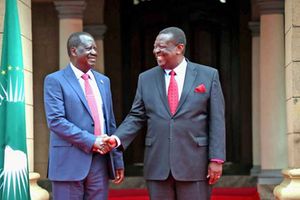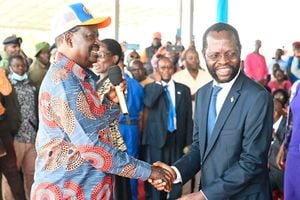
President William Ruto introduces former Prime Minister Raila Odinga to Angola's President João Lourenço during bilateral talks on the sidelines of the 79th session of the UN General Assembly in New York.
President William Ruto has intensified Kenya’s campaign for the African Union Commission (AUC) chairmanship, with Raila Odinga’s team now focusing on rallying the Francophone nations.
President Ruto last week took his time to lay the ground for Mr Odinga's campaigns in West African nations, holding talks with Senegal President Bassirou Diomaye Faye on the sidelines of the 79th United Nations General Assembly (UNGA) in New York, United States of America, where he drummed support for Mr Odinga’s candidacy.
The co-chair of Mr Odinga’s campaign secretariat, former Kenya’s ambassador to the US, Elkanah Odembo stated that while their efforts are directed across the African continent, they want to start focusing on the Francophones to strengthen the country’s bid.
He said that Mr Odinga will in the coming days visit a number of the Francophone nations which have been lined up to make his case.
“Francophone challenge is being taken very seriously. In addition to the meetings in New York, our candidate has been invited by a number of Francophone countries; Ivory Coast, Togo, Senegal, Algeria, and Morocco,” Mr Odembo told Nation.
Mr Odinga is facing Djibouti’s Minister of Foreign Affairs Mahmoud Youssouf, former Mauritius Foreign Minister Anil Kumarsingh Gayan and his former Madagascar counterpart Richard James Randriamandrato.
On Wednesday while still in New York, President Ruto met his Angola counterpart João Lourenço where they discussed the “strengthening of the African Union.”
He also held talks with Cyril Ramaphosa of South Africa as well as Lazarus Chakwera of Malawi.
His meetings came hot on the heels of recent campaigns on the sidelines of the Summit on the Forum on China-Africa Cooperation (FOCAC) in Beijing, China.
President Ruto engaged Presidents Paul Kagame (Rwanda), Umaro Sissoco Embalo (Guinea-Bissau), Faure Essozimna Gnassingbe (Togo), Mahamat Idriss Deby Itno (Chad), Colonel Assimi Goita (Mali) and Hakainde Hichilema (Zambia), urging them to endorse Mr Odinga’s bid.
It was the first time Dr Ruto was reaching out to leaders from the Western bloc after unveiling Mr Odinga's candidacy on August 27.
Mr Odinga says his strategic focus is to harness Africa's rich and vast human and natural resources for the benefit of Africa's peoples — making him the “optimal choice” for this position.
He has pledged to push for the scrapping of visas for intra-Africa travel and the removal of trade barriers. He has also spelt out his vision of a united continent characterised by peace and prosperity for all.
Mr Odinga is seeking to succeed Mr Moussa Faki Mahamat whose term ends in February next year.
Former Kenyan ambassador to Korea Mr Ngovi Kitau said that Kenya’s candidate must convince African Heads of State that he has the clarity, knowledge, and gravitas needed to be an effective Chief Executive Officer for Africa to win the seat in next year’s poll.
“Secondly, a comprehensive campaign strategy to rally support is necessary, at three levels; national, continental, and global. There’s dissonance at the national level which should be addressed,” he said.
Mr Ngovi told Nation that services of at least 40 special envoys are required, for three months, to supplement normal diplomatic efforts, and fast-track effective campaigns ahead of the February 2025 polls.
“The role of the special envoys is to negotiate with the 16 countries and regions engaged in African Summitry, and to jump-start the process for Raila’s one-on-one meetings with African Heads of State.”
He warned that Kenya stands to lose a lot if this bid fails and the failure will likely lead to diplomatic, economic, and political setbacks, including a decline in foreign direct investments.
Professor of International Relations and Diplomacy Gilbert Khadiagala argues that Djibouti presents a strong candidate “but in numbers and reputation alone, Kenya nominally seems to have the upper hand.”
“The major problem with mobilising beyond Eastern/Southern Africa is the Francophone factor: most of the West African Francophone and Lusophone countries may not support the Kenyan candidate.
“Already these countries (under the aegis of the Islamic organisation) have intimated they will not vote for a non-Francophone. So, unless the campaign focuses on overcoming this cultural/linguistic/religious schism, it is going to be difficult for Raila to prevail.”









